What To Do When a Coworker Cries at the Office

What the Experts Say
Many people are uncomfortable with emotional behavior—whether it's positive or negative. "People think to be professional, you need to ignore your emotions and those of the people around you," says Jeffrey Sanchez-Burks, an associate professor of management and organization at the Ross School of Business at the University of Michigan, whose research shows this to be the norm in most American workplaces. But few people can live up to this standard. "We don't leave our humanity at the office door," he says.
Anne Kreamer, author of It's Always Personal: Emotion in the New Workplace, agrees: "You can't decide what to wear to work, let alone close a deal, or make an important presentation without emotions being involved," she says. Crying is a biological reaction to stress, "an emotional reset valve" (and one that is more easily triggered in women for physiological reasons). So instead of ignoring tears, respond to them. Here are some practical steps.
Act Like Yourself
When you're faced with a weeping coworker, your first instinct should be to help. Sanchez-Burks advises approaching the person as if he's someone in your social network outside of work. "We already have the script and the capability, but we need to get over how to do it inside the office," he says. What specifically you do—offer a tissue, ask what's wrong, give a hug, suggest a walk outside—will depend on your relationship, how long you've worked together, and the office culture. The key is to engage, and let the tears flow, instead of ignoring or judging the person.
Figure Out What's Really Going On
Sometimes even when the reasons for the tears seem clear, they might not be. An employee might start sobbing in a review conversation but she's really upset about her mother being sick. Once they've let the emotions out, "it's your job to tease out what's going on and how you can help," Kreamer says. You should be able to gently ask questions that get at the underlying issue. Try saying, "What's going on?" or "Is there anything else you want to tell me?" "You don't need to be a therapist," says Sanchez-Burks, "you just need to be available." At the same time, respect boundaries. She might not want to confide in you. Don't take it personally. Instead, try to monitor the situation from a distance, or ask another employee who's close with her to check in and make sure she's all right.
Keep it Simple
If you've identified that the problem is a personal one, stick to simple and comforting responses—"I'm sorry" or "This is a horrible situation." Don't tell him that everything's going to be okay or imply that he should buck up. And resist the temptation to tell a story of your own. "The last thing in the world an anxious employee wants to hear about is how you handled your own or someone else's illness," says Kreamer.
Focus on Work-Related Concerns
"The most helpful thing you can do is listen and try to help them solve their work-related concerns," Kreamer advises. If you discover that an office issue prompted the crying, work with the employee, and colleagues if necessary, to address it. If it's a personal problem, you can also help her make a plan. You might say something like, "This is rough, let me know what would be most helpful to you and we'll see if we can make that happen." Try to get specific. Can you temporarily reduce her workload? Can you set up regular check-ins to monitor the situation and how it's affecting her work? "In the most extreme case, it could be necessary to suggest a leave of absence and bring in temporary help," Kreamer says.
Don't Play Psychiatrist
There may be some situations that you're not equipped to handle: mental illness or substance abuse, for example. In these cases, or in any situation that you're not comfortable addressing, refer the person to HR or an employee assistance program (EAP). This shouldn't be your first reaction when you see tears, but you also shouldn't take on something out of your comfort zone.
Pay Attention
Don't wait for a crisis to tune into people's emotions. Provide opportunities for colleagues to talk with you about what's going on in their lives. Kreamer suggests asking questions like, "Are there any issues on the horizon that might affect you? Let's put them on the table and see what we can do about them." This gives people permission to open up. "Often employees are frightened to ask for help because they feel they're risking their value to the organization," she says.
Principles to Remember
Do:
- Act like you would in a social situation—be comforting and solicitous
- Keep your responses simple and focused on the employee
- Make a specific plan for handling the situation going forward
Don't:
- Judge people who bring emotions to work—it's not unprofessional to cry, it's human
- Try to get your coworker to stop crying—offer a tissue and let the tears flow
- Push a person to tell you what's happening if he doesn't want to talk about it